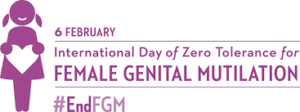 Female genital mutilation (FGM) comprises all procedures that involve altering or injuring the female genitalia for non-medical reasons and is recognized internationally as a violation of the human rights, the health and the integrity of girls and women.
Female genital mutilation (FGM) comprises all procedures that involve altering or injuring the female genitalia for non-medical reasons and is recognized internationally as a violation of the human rights, the health and the integrity of girls and women.
Girls who undergo female genital mutilation face short-term complications such as severe pain, shock, excessive bleeding, infections, and difficulty in passing urine, as well as long-term consequences for their sexual and reproductive health and mental health.
Although primarily concentrated in 30 countries in Africa and the Middle East, female genital mutilation is a universal problem and is also practiced in some countries in Asia and Latin America. Female genital mutilation continues to persist amongst immigrant populations living in Western Europe, North America, Australia and New Zealand.
To promote the elimination of female genital mutilation, coordinated and systematic
efforts are needed, and they must engage whole communities and focus on human rights, gender equality, sexual education and attention to the needs of women and girls who suffer from its consequences.
* In 2020 alone, there are 4.1 million girls around the world are at risk of
undergoing female genital mutilation.
* According to UNFPA, the cost of preventing female genital mutilation is $95 per
girl today.
* 30 countries where female genital mutilation is prevalent are experiencing high
population growth, with at least 30 per cent of girls undergoing female population
under the age of 15.
* Young people aged 15 to 19 in countries where female genital mutilation is
prevalent are less supportive of continuing the practice than are adults aged 45 to
49.
* In many countries where female genital mutilation is prevalent, young girls have a
dramatically increased chance of growing up without the risk of undergoing this
harmful practice compared to their mothers and grandmothers.















